Mohawk College: Ethnographic Study Proposal on Student Behavior
VerifiedAdded on 2023/01/13
|10
|1434
|26
Report
AI Summary
This document presents a research proposal for an ethnographic study focusing on the behavioral and attitudinal differences between male and female students in complex situations. The study, grounded in a review of relevant literature including the work of Shaffir, Dietz & Stebbins (1994), aims to employ non-participant observation and grounded theory to analyze student interactions in various campus settings. The proposal outlines the research methodology, including the planned observation schedule over seven days at the student center, library, and group discussion areas. It highlights the importance of understanding gendered responses to conflict and problem-solving, citing existing research on gendered behavioral patterns. The study intends to provide unbiased and anonymous observations of students during peak hours, focusing on indicative behaviors, facial expressions, and modes of association towards problematic situations. The proposal also addresses the ethical considerations of the study and emphasizes the relevance of the research topic to understand the increasing conflicts among male and female students in college life due to socio-cultural reasons. The proposal includes a detailed schedule of the project and a list of references.
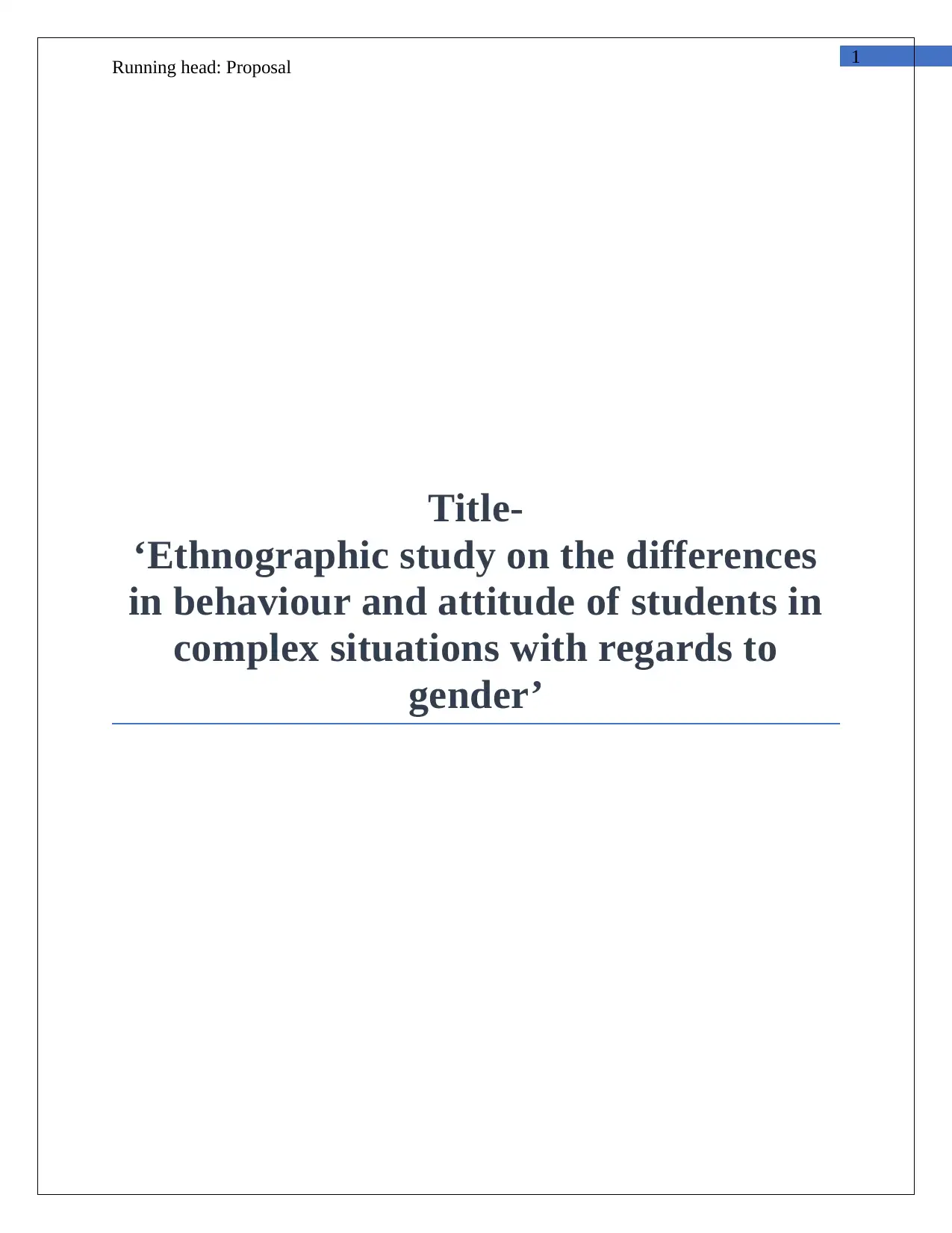
11
Running head: Proposal
Title-
‘Ethnographic study on the differences
in behaviour and attitude of students in
complex situations with regards to
gender’
Running head: Proposal
Title-
‘Ethnographic study on the differences
in behaviour and attitude of students in
complex situations with regards to
gender’
Paraphrase This Document
Need a fresh take? Get an instant paraphrase of this document with our AI Paraphraser

Proposal
Table of Contents
Summary of article..........................................................................................................................3
Proposal...........................................................................................................................................5
Ethnographic plan............................................................................................................................8
References........................................................................................................................................9
2 | P a g e
Table of Contents
Summary of article..........................................................................................................................3
Proposal...........................................................................................................................................5
Ethnographic plan............................................................................................................................8
References........................................................................................................................................9
2 | P a g e
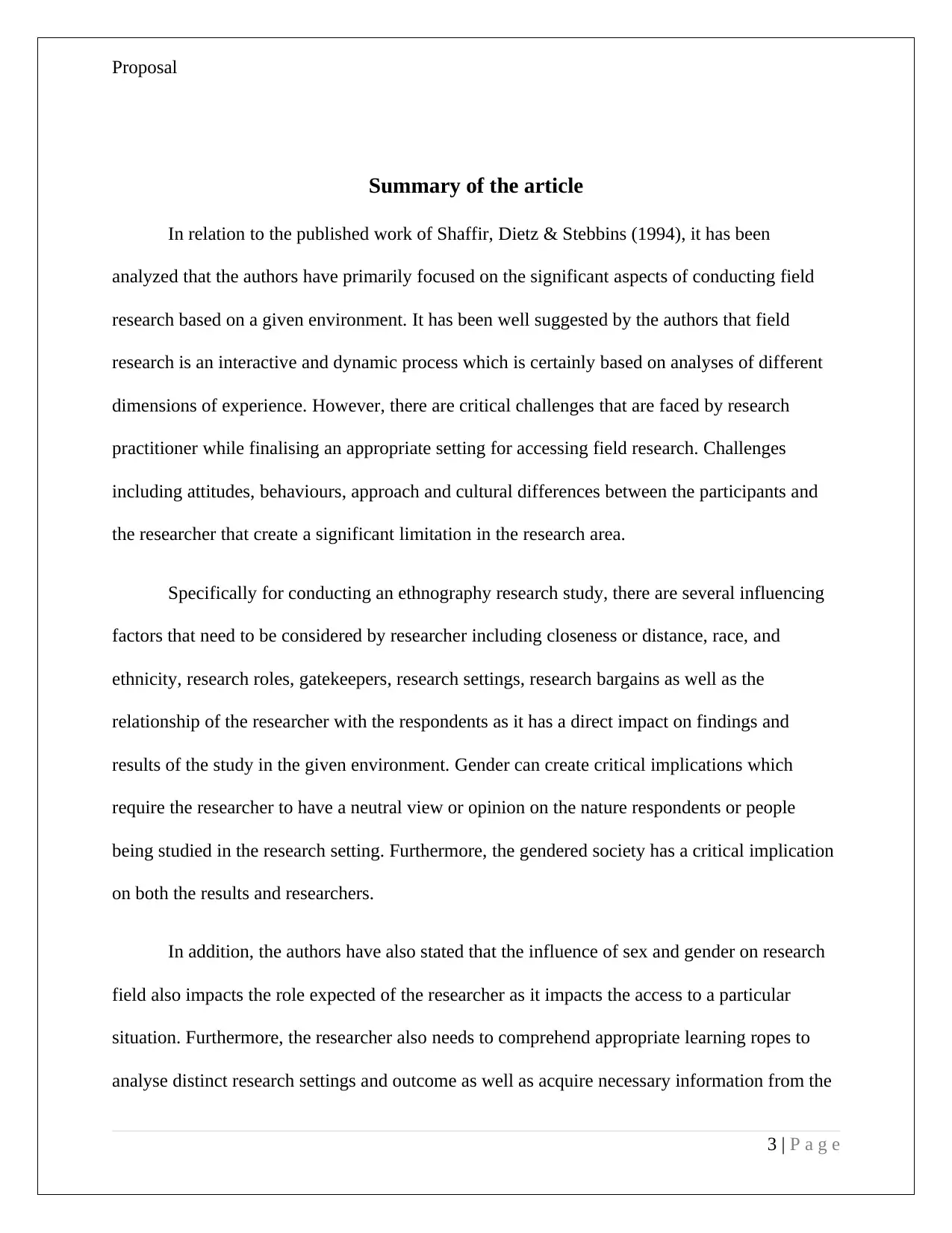
Proposal
Summary of the article
In relation to the published work of Shaffir, Dietz & Stebbins (1994), it has been
analyzed that the authors have primarily focused on the significant aspects of conducting field
research based on a given environment. It has been well suggested by the authors that field
research is an interactive and dynamic process which is certainly based on analyses of different
dimensions of experience. However, there are critical challenges that are faced by research
practitioner while finalising an appropriate setting for accessing field research. Challenges
including attitudes, behaviours, approach and cultural differences between the participants and
the researcher that create a significant limitation in the research area.
Specifically for conducting an ethnography research study, there are several influencing
factors that need to be considered by researcher including closeness or distance, race, and
ethnicity, research roles, gatekeepers, research settings, research bargains as well as the
relationship of the researcher with the respondents as it has a direct impact on findings and
results of the study in the given environment. Gender can create critical implications which
require the researcher to have a neutral view or opinion on the nature respondents or people
being studied in the research setting. Furthermore, the gendered society has a critical implication
on both the results and researchers.
In addition, the authors have also stated that the influence of sex and gender on research
field also impacts the role expected of the researcher as it impacts the access to a particular
situation. Furthermore, the researcher also needs to comprehend appropriate learning ropes to
analyse distinct research settings and outcome as well as acquire necessary information from the
3 | P a g e
Summary of the article
In relation to the published work of Shaffir, Dietz & Stebbins (1994), it has been
analyzed that the authors have primarily focused on the significant aspects of conducting field
research based on a given environment. It has been well suggested by the authors that field
research is an interactive and dynamic process which is certainly based on analyses of different
dimensions of experience. However, there are critical challenges that are faced by research
practitioner while finalising an appropriate setting for accessing field research. Challenges
including attitudes, behaviours, approach and cultural differences between the participants and
the researcher that create a significant limitation in the research area.
Specifically for conducting an ethnography research study, there are several influencing
factors that need to be considered by researcher including closeness or distance, race, and
ethnicity, research roles, gatekeepers, research settings, research bargains as well as the
relationship of the researcher with the respondents as it has a direct impact on findings and
results of the study in the given environment. Gender can create critical implications which
require the researcher to have a neutral view or opinion on the nature respondents or people
being studied in the research setting. Furthermore, the gendered society has a critical implication
on both the results and researchers.
In addition, the authors have also stated that the influence of sex and gender on research
field also impacts the role expected of the researcher as it impacts the access to a particular
situation. Furthermore, the researcher also needs to comprehend appropriate learning ropes to
analyse distinct research settings and outcome as well as acquire necessary information from the
3 | P a g e
⊘ This is a preview!⊘
Do you want full access?
Subscribe today to unlock all pages.

Trusted by 1+ million students worldwide

Proposal
people by ignoring any involvement in the activities of the respondents or participants and focus
on observations only.
4 | P a g e
people by ignoring any involvement in the activities of the respondents or participants and focus
on observations only.
4 | P a g e
Paraphrase This Document
Need a fresh take? Get an instant paraphrase of this document with our AI Paraphraser
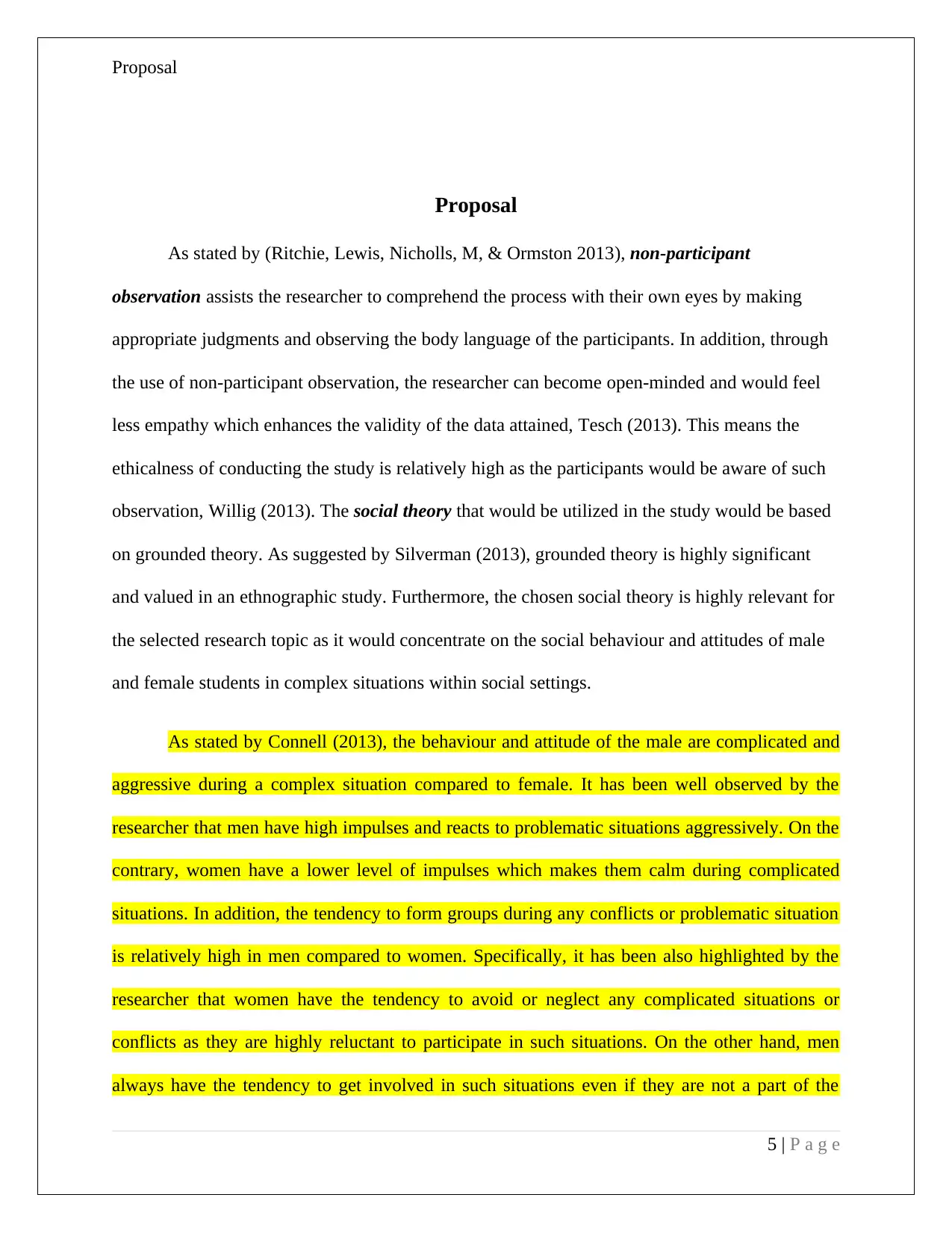
Proposal
Proposal
As stated by (Ritchie, Lewis, Nicholls, M, & Ormston 2013), non-participant
observation assists the researcher to comprehend the process with their own eyes by making
appropriate judgments and observing the body language of the participants. In addition, through
the use of non-participant observation, the researcher can become open-minded and would feel
less empathy which enhances the validity of the data attained, Tesch (2013). This means the
ethicalness of conducting the study is relatively high as the participants would be aware of such
observation, Willig (2013). The social theory that would be utilized in the study would be based
on grounded theory. As suggested by Silverman (2013), grounded theory is highly significant
and valued in an ethnographic study. Furthermore, the chosen social theory is highly relevant for
the selected research topic as it would concentrate on the social behaviour and attitudes of male
and female students in complex situations within social settings.
As stated by Connell (2013), the behaviour and attitude of the male are complicated and
aggressive during a complex situation compared to female. It has been well observed by the
researcher that men have high impulses and reacts to problematic situations aggressively. On the
contrary, women have a lower level of impulses which makes them calm during complicated
situations. In addition, the tendency to form groups during any conflicts or problematic situation
is relatively high in men compared to women. Specifically, it has been also highlighted by the
researcher that women have the tendency to avoid or neglect any complicated situations or
conflicts as they are highly reluctant to participate in such situations. On the other hand, men
always have the tendency to get involved in such situations even if they are not a part of the
5 | P a g e
Proposal
As stated by (Ritchie, Lewis, Nicholls, M, & Ormston 2013), non-participant
observation assists the researcher to comprehend the process with their own eyes by making
appropriate judgments and observing the body language of the participants. In addition, through
the use of non-participant observation, the researcher can become open-minded and would feel
less empathy which enhances the validity of the data attained, Tesch (2013). This means the
ethicalness of conducting the study is relatively high as the participants would be aware of such
observation, Willig (2013). The social theory that would be utilized in the study would be based
on grounded theory. As suggested by Silverman (2013), grounded theory is highly significant
and valued in an ethnographic study. Furthermore, the chosen social theory is highly relevant for
the selected research topic as it would concentrate on the social behaviour and attitudes of male
and female students in complex situations within social settings.
As stated by Connell (2013), the behaviour and attitude of the male are complicated and
aggressive during a complex situation compared to female. It has been well observed by the
researcher that men have high impulses and reacts to problematic situations aggressively. On the
contrary, women have a lower level of impulses which makes them calm during complicated
situations. In addition, the tendency to form groups during any conflicts or problematic situation
is relatively high in men compared to women. Specifically, it has been also highlighted by the
researcher that women have the tendency to avoid or neglect any complicated situations or
conflicts as they are highly reluctant to participate in such situations. On the other hand, men
always have the tendency to get involved in such situations even if they are not a part of the
5 | P a g e
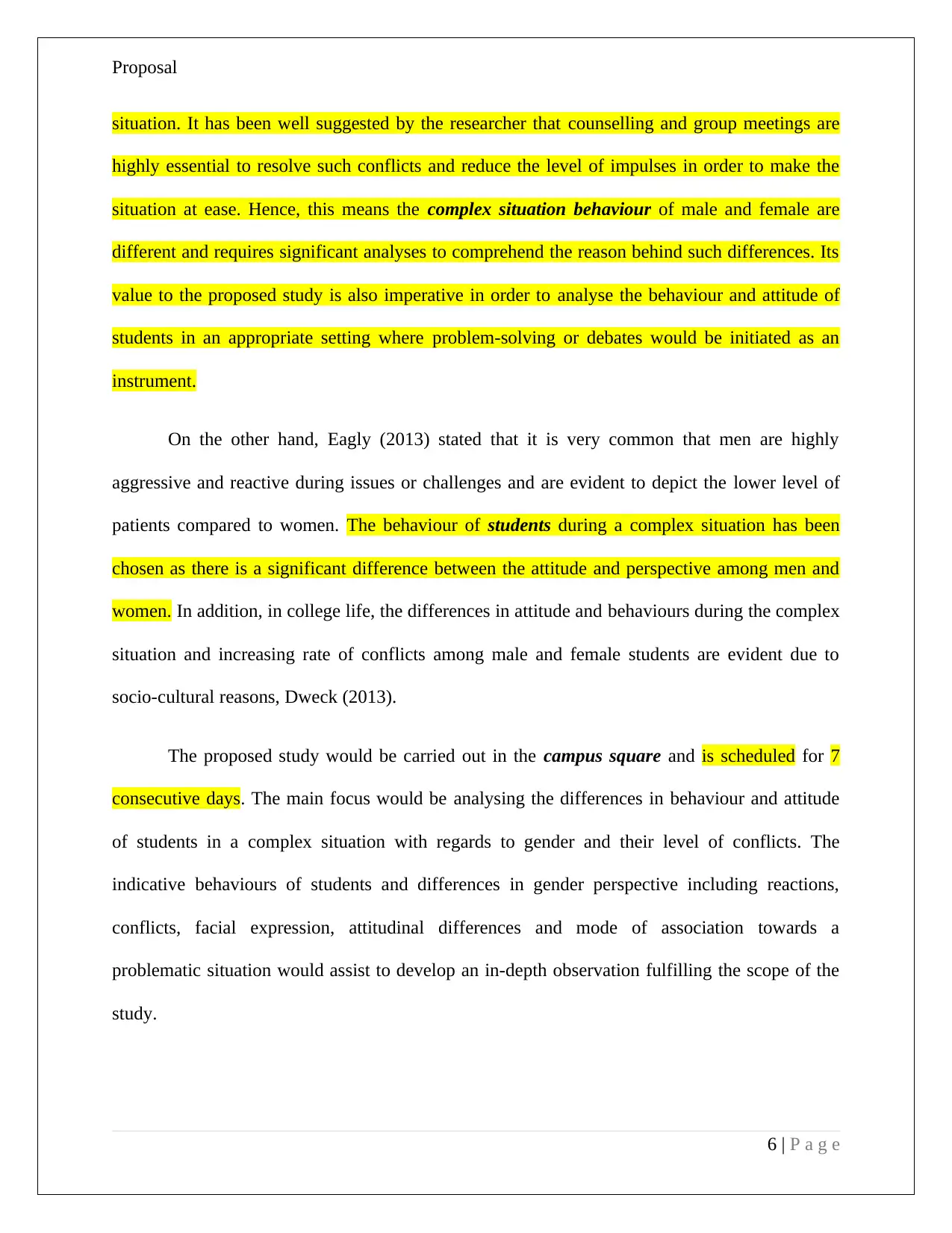
Proposal
situation. It has been well suggested by the researcher that counselling and group meetings are
highly essential to resolve such conflicts and reduce the level of impulses in order to make the
situation at ease. Hence, this means the complex situation behaviour of male and female are
different and requires significant analyses to comprehend the reason behind such differences. Its
value to the proposed study is also imperative in order to analyse the behaviour and attitude of
students in an appropriate setting where problem-solving or debates would be initiated as an
instrument.
On the other hand, Eagly (2013) stated that it is very common that men are highly
aggressive and reactive during issues or challenges and are evident to depict the lower level of
patients compared to women. The behaviour of students during a complex situation has been
chosen as there is a significant difference between the attitude and perspective among men and
women. In addition, in college life, the differences in attitude and behaviours during the complex
situation and increasing rate of conflicts among male and female students are evident due to
socio-cultural reasons, Dweck (2013).
The proposed study would be carried out in the campus square and is scheduled for 7
consecutive days. The main focus would be analysing the differences in behaviour and attitude
of students in a complex situation with regards to gender and their level of conflicts. The
indicative behaviours of students and differences in gender perspective including reactions,
conflicts, facial expression, attitudinal differences and mode of association towards a
problematic situation would assist to develop an in-depth observation fulfilling the scope of the
study.
6 | P a g e
situation. It has been well suggested by the researcher that counselling and group meetings are
highly essential to resolve such conflicts and reduce the level of impulses in order to make the
situation at ease. Hence, this means the complex situation behaviour of male and female are
different and requires significant analyses to comprehend the reason behind such differences. Its
value to the proposed study is also imperative in order to analyse the behaviour and attitude of
students in an appropriate setting where problem-solving or debates would be initiated as an
instrument.
On the other hand, Eagly (2013) stated that it is very common that men are highly
aggressive and reactive during issues or challenges and are evident to depict the lower level of
patients compared to women. The behaviour of students during a complex situation has been
chosen as there is a significant difference between the attitude and perspective among men and
women. In addition, in college life, the differences in attitude and behaviours during the complex
situation and increasing rate of conflicts among male and female students are evident due to
socio-cultural reasons, Dweck (2013).
The proposed study would be carried out in the campus square and is scheduled for 7
consecutive days. The main focus would be analysing the differences in behaviour and attitude
of students in a complex situation with regards to gender and their level of conflicts. The
indicative behaviours of students and differences in gender perspective including reactions,
conflicts, facial expression, attitudinal differences and mode of association towards a
problematic situation would assist to develop an in-depth observation fulfilling the scope of the
study.
6 | P a g e
⊘ This is a preview!⊘
Do you want full access?
Subscribe today to unlock all pages.

Trusted by 1+ million students worldwide
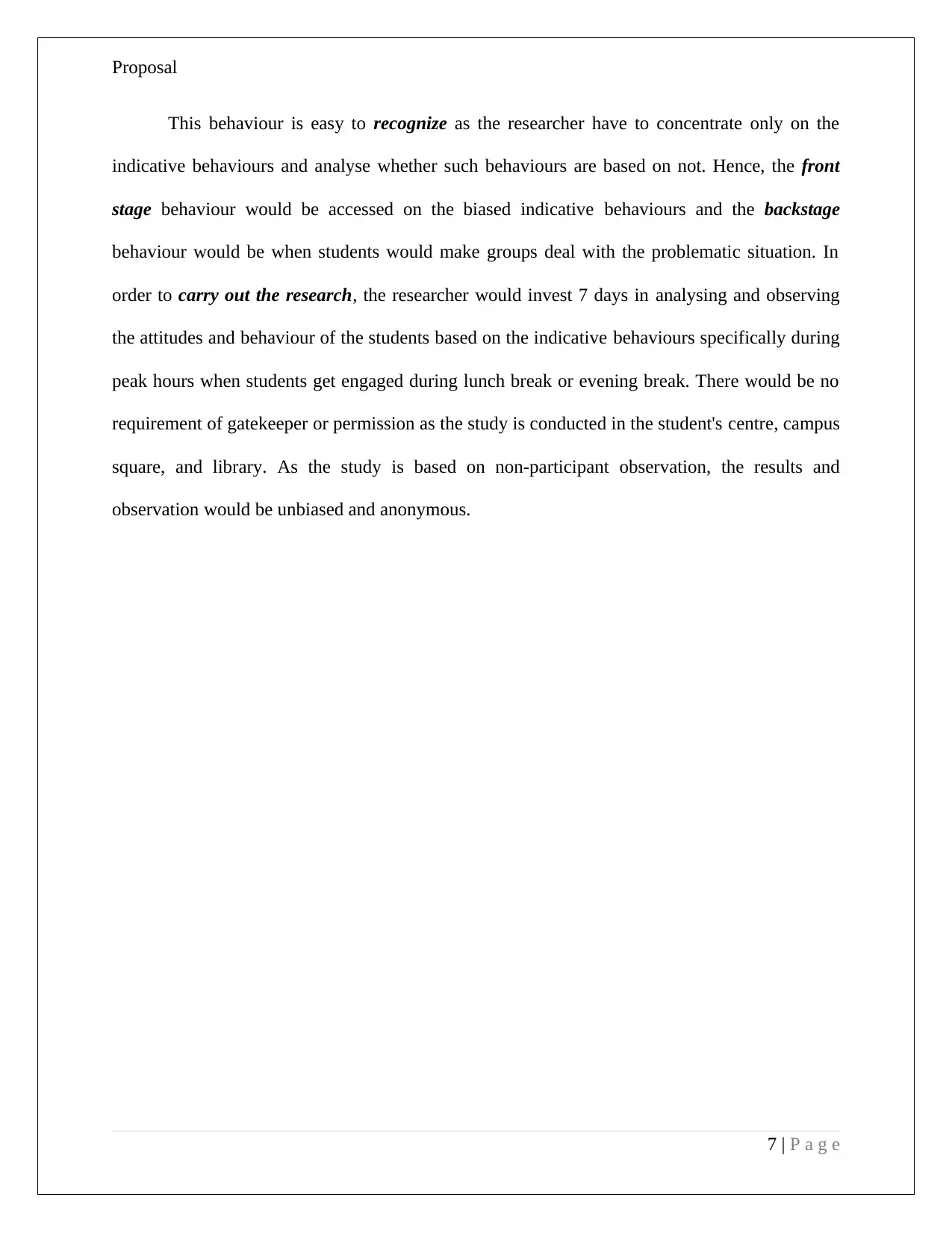
Proposal
This behaviour is easy to recognize as the researcher have to concentrate only on the
indicative behaviours and analyse whether such behaviours are based on not. Hence, the front
stage behaviour would be accessed on the biased indicative behaviours and the backstage
behaviour would be when students would make groups deal with the problematic situation. In
order to carry out the research, the researcher would invest 7 days in analysing and observing
the attitudes and behaviour of the students based on the indicative behaviours specifically during
peak hours when students get engaged during lunch break or evening break. There would be no
requirement of gatekeeper or permission as the study is conducted in the student's centre, campus
square, and library. As the study is based on non-participant observation, the results and
observation would be unbiased and anonymous.
7 | P a g e
This behaviour is easy to recognize as the researcher have to concentrate only on the
indicative behaviours and analyse whether such behaviours are based on not. Hence, the front
stage behaviour would be accessed on the biased indicative behaviours and the backstage
behaviour would be when students would make groups deal with the problematic situation. In
order to carry out the research, the researcher would invest 7 days in analysing and observing
the attitudes and behaviour of the students based on the indicative behaviours specifically during
peak hours when students get engaged during lunch break or evening break. There would be no
requirement of gatekeeper or permission as the study is conducted in the student's centre, campus
square, and library. As the study is based on non-participant observation, the results and
observation would be unbiased and anonymous.
7 | P a g e
Paraphrase This Document
Need a fresh take? Get an instant paraphrase of this document with our AI Paraphraser
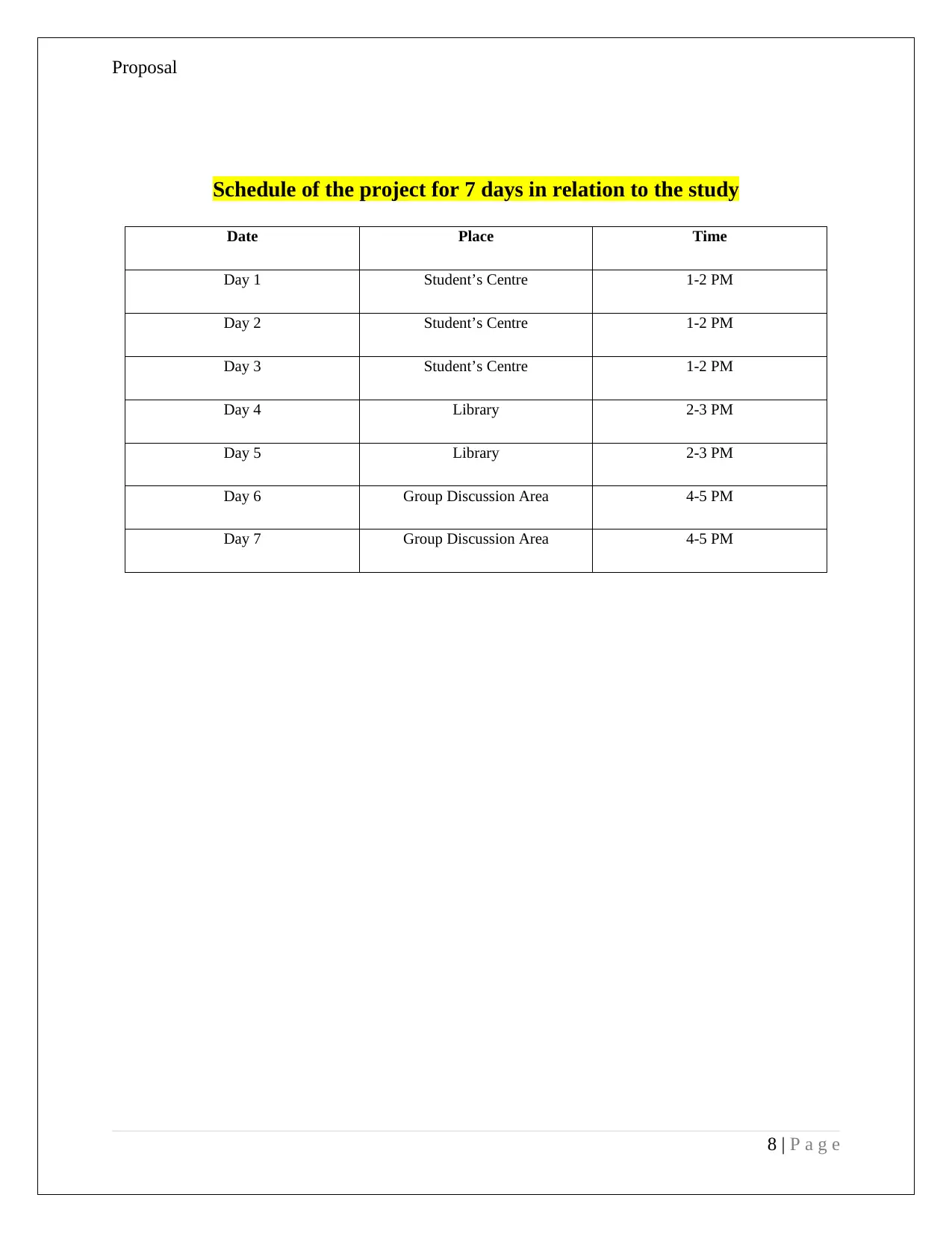
Proposal
Schedule of the project for 7 days in relation to the study
Date Place Time
Day 1 Student’s Centre 1-2 PM
Day 2 Student’s Centre 1-2 PM
Day 3 Student’s Centre 1-2 PM
Day 4 Library 2-3 PM
Day 5 Library 2-3 PM
Day 6 Group Discussion Area 4-5 PM
Day 7 Group Discussion Area 4-5 PM
8 | P a g e
Schedule of the project for 7 days in relation to the study
Date Place Time
Day 1 Student’s Centre 1-2 PM
Day 2 Student’s Centre 1-2 PM
Day 3 Student’s Centre 1-2 PM
Day 4 Library 2-3 PM
Day 5 Library 2-3 PM
Day 6 Group Discussion Area 4-5 PM
Day 7 Group Discussion Area 4-5 PM
8 | P a g e
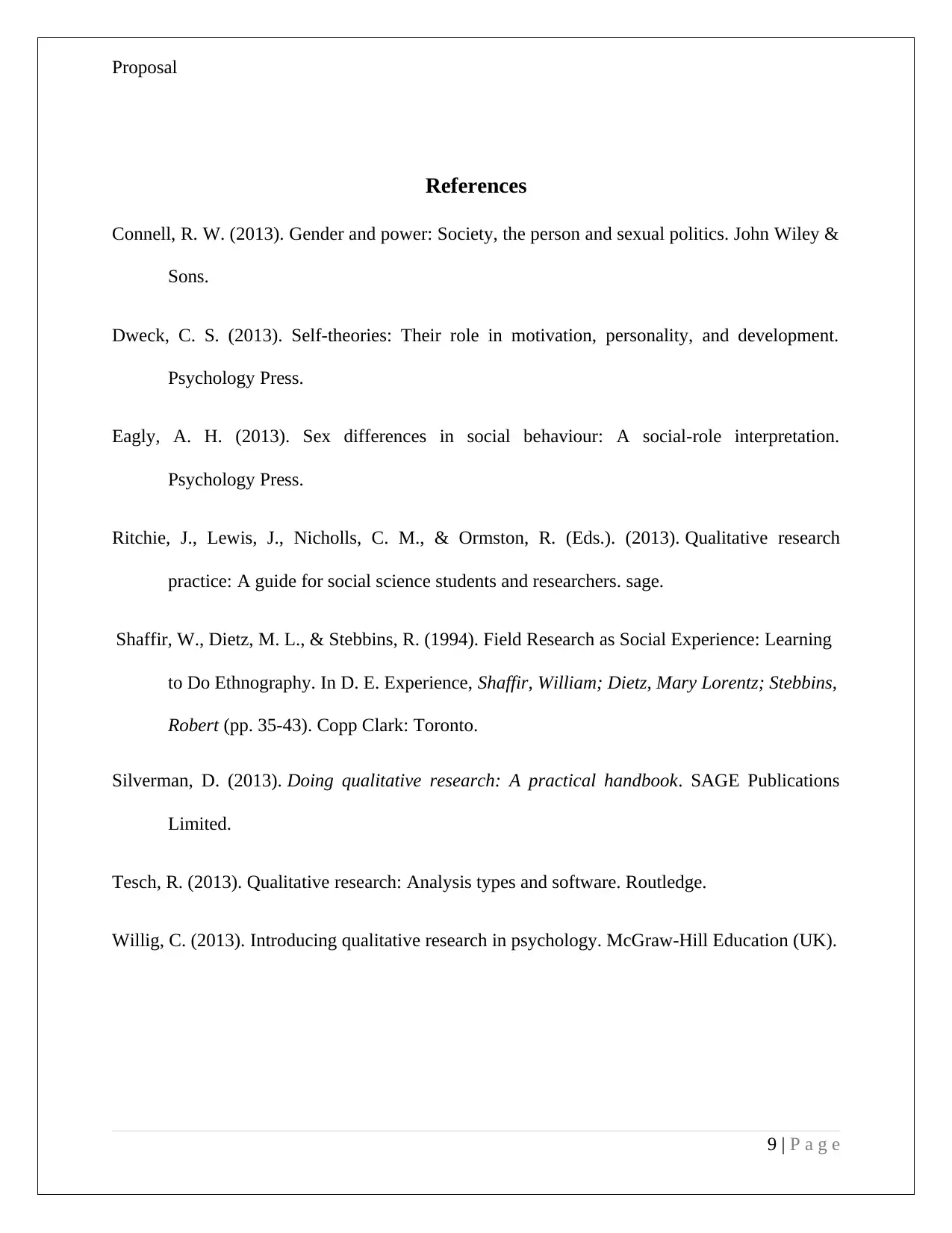
Proposal
References
Connell, R. W. (2013). Gender and power: Society, the person and sexual politics. John Wiley &
Sons.
Dweck, C. S. (2013). Self-theories: Their role in motivation, personality, and development.
Psychology Press.
Eagly, A. H. (2013). Sex differences in social behaviour: A social-role interpretation.
Psychology Press.
Ritchie, J., Lewis, J., Nicholls, C. M., & Ormston, R. (Eds.). (2013). Qualitative research
practice: A guide for social science students and researchers. sage.
Shaffir, W., Dietz, M. L., & Stebbins, R. (1994). Field Research as Social Experience: Learning
to Do Ethnography. In D. E. Experience, Shaffir, William; Dietz, Mary Lorentz; Stebbins,
Robert (pp. 35-43). Copp Clark: Toronto.
Silverman, D. (2013). Doing qualitative research: A practical handbook. SAGE Publications
Limited.
Tesch, R. (2013). Qualitative research: Analysis types and software. Routledge.
Willig, C. (2013). Introducing qualitative research in psychology. McGraw-Hill Education (UK).
9 | P a g e
References
Connell, R. W. (2013). Gender and power: Society, the person and sexual politics. John Wiley &
Sons.
Dweck, C. S. (2013). Self-theories: Their role in motivation, personality, and development.
Psychology Press.
Eagly, A. H. (2013). Sex differences in social behaviour: A social-role interpretation.
Psychology Press.
Ritchie, J., Lewis, J., Nicholls, C. M., & Ormston, R. (Eds.). (2013). Qualitative research
practice: A guide for social science students and researchers. sage.
Shaffir, W., Dietz, M. L., & Stebbins, R. (1994). Field Research as Social Experience: Learning
to Do Ethnography. In D. E. Experience, Shaffir, William; Dietz, Mary Lorentz; Stebbins,
Robert (pp. 35-43). Copp Clark: Toronto.
Silverman, D. (2013). Doing qualitative research: A practical handbook. SAGE Publications
Limited.
Tesch, R. (2013). Qualitative research: Analysis types and software. Routledge.
Willig, C. (2013). Introducing qualitative research in psychology. McGraw-Hill Education (UK).
9 | P a g e
⊘ This is a preview!⊘
Do you want full access?
Subscribe today to unlock all pages.

Trusted by 1+ million students worldwide

Proposal
10 | P a g e
10 | P a g e
1 out of 10
Related Documents
Your All-in-One AI-Powered Toolkit for Academic Success.
+13062052269
info@desklib.com
Available 24*7 on WhatsApp / Email
![[object Object]](/_next/static/media/star-bottom.7253800d.svg)
Unlock your academic potential
Copyright © 2020–2026 A2Z Services. All Rights Reserved. Developed and managed by ZUCOL.





